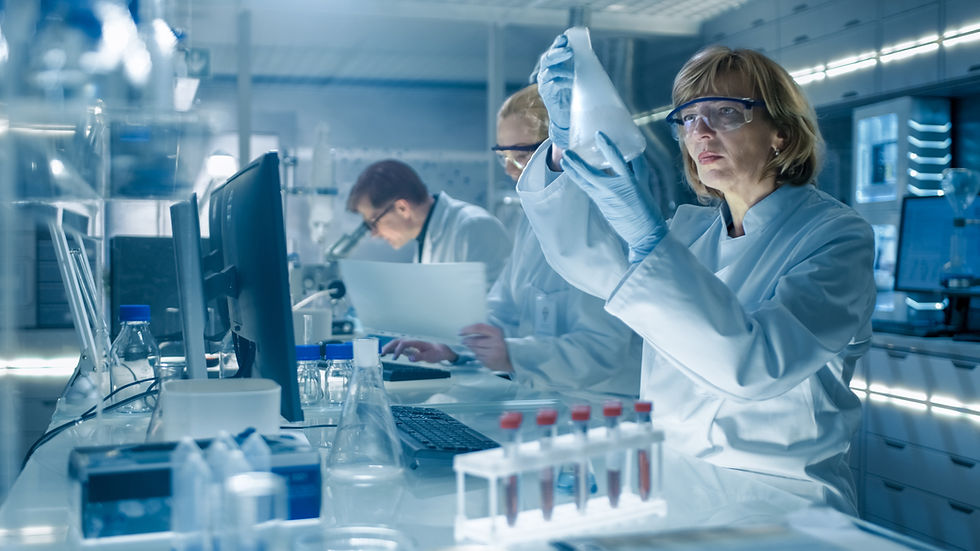What Types of Medical Tests Are There?
- chris06611
- Dec 27, 2024
- 2 min read

Medical tests play a crucial role in detecting, diagnosing, and monitoring various health conditions. They provide healthcare professionals with valuable insights into your body’s state. But what are the different types of medical tests available, and what are they used for? Let’s explore the various options.
1. Blood Tests
Blood draws are probably the most well-known type of medical test. They involve collecting a blood sample, usually from the arm, to analyze various parameters such as:
Glucose levels: useful for diagnosing diabetes.
Cholesterol levels: to assess cardiovascular risk.
Inflammatory markers: to detect infections or chronic diseases.
Hormone levels: such as thyroid or sex hormones.
Blood tests are quick and can reveal a wide range of health issues.
2. Urine Tests
Urinalysis is used to examine the composition of urine and detect abnormalities, such as:
Urinary tract infections.
The presence of sugar, which may indicate diabetes.
Renal or metabolic disorders.
Traces of drugs or medications.
These tests are often requested during routine check-ups or to monitor certain conditions.
3. Nasal and Throat Swabs
These tests involve inserting a swab (a long cotton-tipped stick) into the nose or throat to collect mucus samples. They are mainly used to detect:
Respiratory viruses, such as the flu or COVID-19.
Specific bacteria, like streptococcus in the throat.
These have become very common since the pandemic but remain essential for diagnosing various infections.
4. Skin Samples
For skin-related issues, a professional may perform a skin test by scraping the skin's surface or taking a small fragment (biopsy). These tests help to:
Identify fungal infections (like ringworm).
Analyze suspicious lesions to detect potential skin cancer.
Diagnose inflammatory or autoimmune skin conditions.
5. Gynecological Tests
These tests are specifically conducted in women to detect abnormalities or infections in the reproductive system. Examples include:
Pap smear: to screen for cervical cancer.
Vaginal swabs: to diagnose infections like bacterial vaginosis or yeast infections.
These are often part of routine gynecological check-ups.
6. Stool Tests
Stool analysis is requested to detect digestive or intestinal issues, such as:
Bacterial or parasitic infections.
The presence of blood, which may indicate colorectal cancer.
Inflammation, useful for diagnosing conditions like Crohn’s disease.
These tests are simple but vital for understanding digestive disorders.
7. Oral Swabs
Performed by swabbing the inside of the cheek, these tests are commonly used for:
DNA testing, often for genetic research.
Screening for certain viral infections.
They are painless and very quick to perform.
8. Biopsies
A biopsy involves taking a small tissue sample from an organ or a suspicious area for analysis. It is used to:
Diagnose cancer.
Identify autoimmune or inflammatory diseases.
Assess tissue health during surgery.
Though more invasive, biopsies provide detailed information.
Conclusion
Medical tests are varied and cater to specific needs. From routine blood draws to specialized biopsies, each method plays a crucial role in maintaining your health.
If you have questions about a specific test or how to prepare for one, don’t hesitate to ask your healthcare provider or consult a specialized home healthcare service.
Your Turn:Have you ever undergone a medical test? Share your questions or experiences in the comments!
.png)



Really informative breakdown of different medical tests and how they help detect and track health issues. It’s fascinating how each test reveals something different about our well-being. For a deeper look into how blood and urine drug screenings compare, this article is worth reading: https://rapidhiresolutions.com/drug-tests-and-their-applications/
This is a great overview of the various types of medical tests and their importance in diagnosing and monitoring health conditions. It's amazing how each test offers valuable insights into different aspects of our health. If you're interested in learning about the differences between blood and urine tests, check out this helpful article: Key Differences Between Blood and Urine Tests.